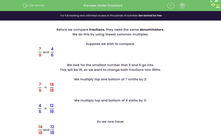Before we compare fractions, they need the same denominators.
We do this by using lowest common multiples.
Suppose we wish to compare 7/9 and 4/6.
We look for the smallest number that 9 and 6 go into.
This is called the lowest common multiple (LCM).
This will be 18, so we want to change both fractions into 18ths.
We multiply the numerator and the denominator of 7/9 by 2:
7/9 = 14/18
We multiply the numerator and the denominator of 4/6 by 3:
4/6 = 12/18
So now we can compare the fractions.
14/18 > 12/18
7/9 > 4/6

Let's try an example question.
Example
Place these fractions in ascending order of size.
5/8, 1/2 and 2/3.
Answer
The lowest common multiple of 8, 2 and 3 is 24.
3 × 8 = 24
12 × 2 = 24
8 × 3 = 24
We multiply the numerator and the denominator of 5/8 by 3:
5/8 = 15/24
We multiply the numerator and the denominator of 1/2 by 12:
1/2 = 12/24
We multiply the numerator and the denominator of 2/3 by 8:
2/3 = 16/24
We can order the equivalent fractions in ascending order like this:
12/24 < 15/24 < 16/24
The last step is to place our three original fractions in ascending order as shown below:
1/2 < 5/8 < 2/3
Remember that ascending order means from lowest to highest - like going upstairs!

It's time for you to have a go at some questions now.








